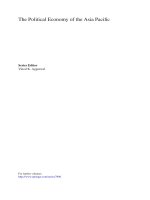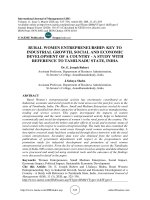Economic growth and economic development 247
Bạn đang xem bản rút gọn của tài liệu. Xem và tải ngay bản đầy đủ của tài liệu tại đây (132.19 KB, 1 trang )
Introduction to Modern Economic Growth
However, the term in square brackets has a limit of the form 0/0. Let us next write
this as
ln (1 + ∆t · r)
r/ (1 + ∆t · r)
= lim
= rT
∆t→0
∆t→0
∆t/T
1/T
where the first equality follows from l’Hopital’s rule. Therefore,
lim
v (T ) = exp (rT ) .
Conversely, $1 in T periods from now, is worth exp (−rT ) today. The same reasoning
applies to discounting utility, so the utility of consuming c (t) in period t evaluated
at time t = 0 is exp (−ρt) u (c (t)), where ρ denotes the (subjective) discount rate.
5.6. Welfare Theorems
We are ultimately interested in equilibrium growth. But in general competitive
economies such as those analyzed so far, we know that there should be a close
connection between Pareto optima and competitive equilibria. So far we did not
exploit these connections, since without explicitly specifying preferences we could
not compare locations. We now introduce these theorems and develop the relevant
connections between the theory of economic growth and dynamic general equilibrium
models.
Let us start with models that have a finite number of consumers, so that in
terms of the notation above, the set H is finite. However, we allow an infinite num-
ber of commodities, since in dynamic growth models, we are ultimately interested
in economies that have an infinite number of time periods, thus an infinite number
of commodities. The results stated in this section have analogues for economies
with a continuum of commodities (corresponding to dynamic economies in continuous time), but for the sake of brevity and to reduce technical details, we focus on
economies with a countable number of commodities.
â ê
Therefore, let the commodities be indexed by j ∈ N and xi ≡ xij j=0 be the
â ê
consumption bundle of household i, and ω i ≡ ω ij j=0 be its endowment bundle. In
addition, let us assume that feasible xi ’s must belong to some consumption set X i ⊂
R∞ . We introduce the consumption set in order to allow for situations in which an
individual may not have negative consumption of certain commodities. The consumption set is a subset of R∞ since consumption bundles are represented by infinite
233









